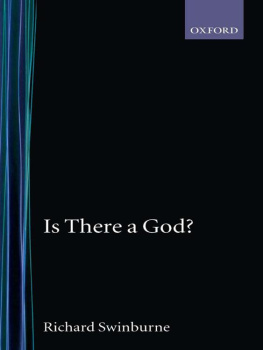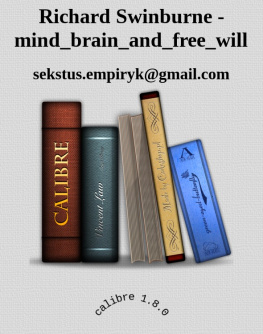Richard Swinburne - Is There a God?
Here you can read online Richard Swinburne - Is There a God? full text of the book (entire story) in english for free. Download pdf and epub, get meaning, cover and reviews about this ebook. year: 1996, publisher: Oxford University Press, USA, genre: Religion. Description of the work, (preface) as well as reviews are available. Best literature library LitArk.com created for fans of good reading and offers a wide selection of genres:
Romance novel
Science fiction
Adventure
Detective
Science
History
Home and family
Prose
Art
Politics
Computer
Non-fiction
Religion
Business
Children
Humor
Choose a favorite category and find really read worthwhile books. Enjoy immersion in the world of imagination, feel the emotions of the characters or learn something new for yourself, make an fascinating discovery.
- Book:Is There a God?
- Author:
- Publisher:Oxford University Press, USA
- Genre:
- Year:1996
- Rating:4 / 5
- Favourites:Add to favourites
- Your mark:
- 80
- 1
- 2
- 3
- 4
- 5
Is There a God?: summary, description and annotation
We offer to read an annotation, description, summary or preface (depends on what the author of the book "Is There a God?" wrote himself). If you haven't found the necessary information about the book — write in the comments, we will try to find it.
Is There a God? — read online for free the complete book (whole text) full work
Below is the text of the book, divided by pages. System saving the place of the last page read, allows you to conveniently read the book "Is There a God?" online for free, without having to search again every time where you left off. Put a bookmark, and you can go to the page where you finished reading at any time.
Font size:
Interval:
Bookmark:
IS THERE A GOD?
Richard Swinburne
Oxford New York
OXFORD UNIVERSITY PRESS
This book has been printed digitally and produced in a standard specification
in order to ensure its continuing availability

Great Clarendon Street, Oxford OX2 6DP
Oxford University Press is a department of the University of Oxford.
It furthers the Universitys objective of excellence in research, scholarship,
and education by publishing worldwide in
Oxford New York
Auckland Bangkok Buenos Aires Cape Town Chennai
Dar es Salaam Delhi Hong Kong Istanbul Karachi Kolkata
Kuala Lumpur Madrid Melbourne Mexico City Mumbai Nairobi
So Paulo Shanghai Taipei Tokyo Toronto
Oxford is a registered trade mark of Oxford University Press
in the UK and in certain other countries
Published in the United States
by Oxford University Press Inc., New York
Richard Swinburne 1996
The moral rights of the author have been asserted
Database right Oxford University Press (maker)
Reprinted 2003
All rights reserved. No part of this publication may be reproduced,
stored in a retrieval system, or transmitted, in any form or by any means,
without the prior permission in writing of Oxford University Press,
or as expressly permitted by law, or under terms agreed with the appropriate
reprographics rights organization. Enquiries concerning reproduction
outside the scope of the above should be sent to the Rights Department,
Oxford University Press, at the address above
You must not circulate this book in any other binding or cover
and you must impose this same condition on any acquirer
ISBN 0198235445
I AM grateful to a number of people who read a first version of Is There a God? and helped me to express my ideas in simpler ways than I would otherwise have done; and among them especially Basil Mitchell, Norman Kretzmann, Tim Barton and Peter Momtchiloff of Oxford University Press, and my daughter Caroline. I am also most grateful to Mrs Anita Holmes for some very fast typing of two versions of this book, in the midst of many other commitments.
How the Existence of God Explains Miracles and Religious Experience
For the last twenty or thirty years there has been a revival of serious debate among philosophers in Britain and the United States about the existence of God, conducted at a high level of intellectual rigour. It has been recognized that the subject is not only of the highest importance, but also of great intellectual interest. Christian thinkers have been to the fore in this debate, and the debate has led to a considerable growth in numbers of philosophy students taking courses on the philosophy of religion. Little of this, however, has reached the general public, who have been led by journalists and broadcasters to believe that the existence of God is, intellectually, a lost cause and that religious faith is an entirely non-rational matter.
The public thinking about such issues has been influenced by several books by distinguished scientists, among them Richard Dawkinss The Blind Watchmaker (1986) and Stephen Hawkings A Brief History of Time (1988). With the scientific theories advocated in these books I have relatively little quarrel, and can only admire Hawkings depth of physical intuition and Dawkinss clarity of exposition. But these books carry the suggestion that their scientific theories indicate that there is no God who is in any way involved in sustaining the world. These authors are not, however, very familiar with the philosophical debate and are often unaware of the extent to which their views about God are open to criticism. My aim in writing this book is to help to remedy this situation by putting forward for a wider public a short version of the positive case for the existence of God put forward in my earlier book The Existence of God (1979).
The basic structure of my argument is this. Scientists, historians, and detectives observe data and proceed thence to some theory about what best explains the occurrence of these data. We can analyse the criteria which they use in reaching a conclusion that a certain theory is better supported by the data than a different theorythat is, is more likely, on the basis of those data, to be true. Using those same criteria, we find that the view that there is a God explains everything we observe, not just some narrow range of data. It explains the fact that there is a universe at all, that scientific laws operate within it, that it contains conscious animals and humans with very complex intricately organized bodies, that we have abundant opportunities for developing ourselves and the world, as well as the more particular data that humans report miracles and have religious experiences. In so far as scientific causes and laws explain some of these things (and in part they do), these very causes and laws need explaining, and Gods action explains them. The very same criteria which scientists use to reach their own theories lead us to move beyond those theories to a creator God who sustains everything in existence.
GOD
My topic is the claim that there is a God, understood in the way that Western religion (Christianity, Judaism, and Islam) has generally understood that claim. I call that claim theism. In this chapter I shall spell out what the claim amounts to. Then in later chapters we can go on to the grounds for believing it to be true. I emphasize that, in this chapter, when I write that God does this or is like that, I am not assuming that there is a God, but merely spelling out what the claim that there is a God amounts to. I am not directly concerned to assess the claim that there is a God, where God is being understood in some quite different sense, as the name of a quite different sort of being from the one worshipped in Western religion. But, in arguing at various points that theism explains the observed data well, I shall occasionally point out that other hypotheses, including ones which invoke a God in some other sense, explain the data less well. Even within the mainstream of the Western tradition, there have been some differences about what God is like, and I shall draw attention to some of these differences in this chapter and suggest that some views about what God is like are to be preferred to others.
Theism claims that God is a personal beingthat is, in some sense a person. By a person I mean an individual with basic powers (to act intentionally), purposes, and beliefs.
An intentional action is one which a person does and means to doas when I walk downstairs or say something which I mean to say. A basic action is one which a person does intentionally just like that and not by doing any other intentional action. My going from Oxford to London is a non-basic action, because I do it by doing various other actionsgoing to the station, getting on the train, etc. But squeezing my hand or moving my leg and even saying this are basic actions. I just do them, not by doing any other intentional act. (True, certain events have to happen in my bodymy nerves have to transmit impulsesif I am to perform the basic action. But these are not events which I bring about intentionally. They just happenI may not even know about them.) By a basic power I mean a power to perform a basic action. We humans have similar basic powers to each other. They are normally confined to powers of thought and powers over the small chunk of matter which each of us calls his or her body. I can only produce effects in the world outside my body by doing something intentional with my body. I can open a door by grasping the handle with my hand and pulling it towards me; or I can get you to know something by using my mouth to tell you something. When I produce some effect intentionally (e.g. the door being open) by doing some other action (e.g. pulling it towards me), doing the former is performing a non-basic action. When I go to London, or write a book, or even put a screw into a wall, these are non-basic actions which I do by doing some basic actions. When I perform any intentional action, I seek thereby to achieve some
Next pageFont size:
Interval:
Bookmark:
Similar books «Is There a God?»
Look at similar books to Is There a God?. We have selected literature similar in name and meaning in the hope of providing readers with more options to find new, interesting, not yet read works.
Discussion, reviews of the book Is There a God? and just readers' own opinions. Leave your comments, write what you think about the work, its meaning or the main characters. Specify what exactly you liked and what you didn't like, and why you think so.













